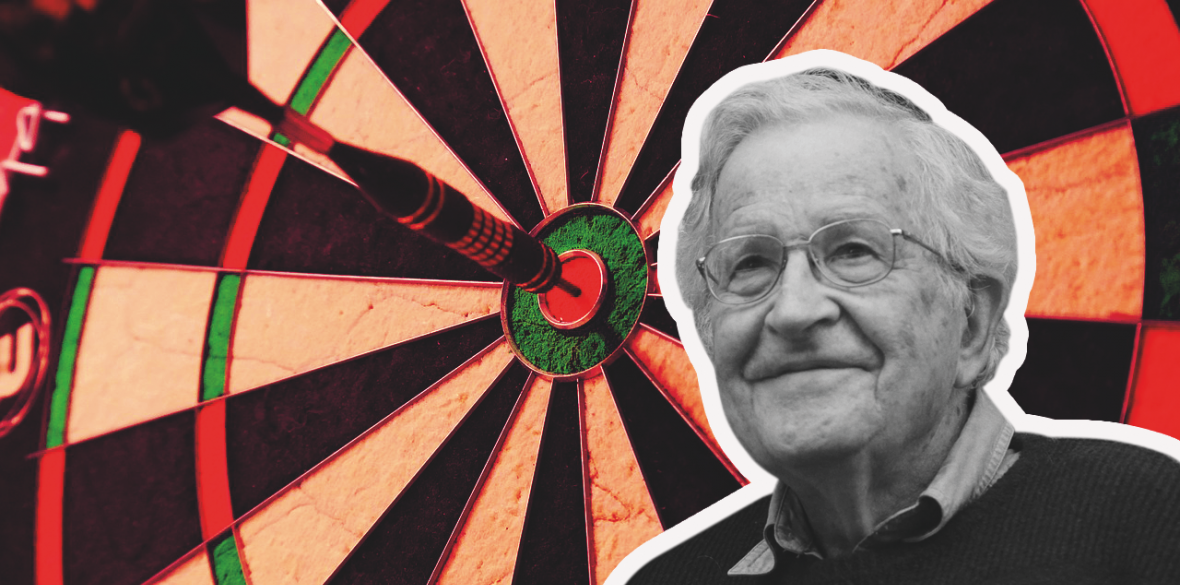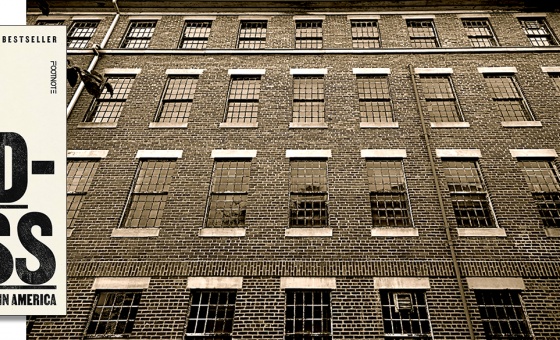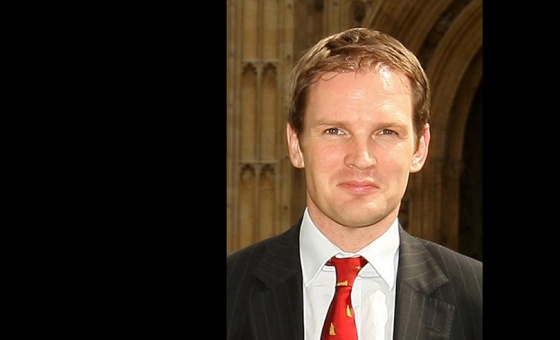This is the last article you can read this month
You can read more article this month
You can read more articles this month
Sorry your limit is up for this month
Reset on:
Please help support the Morning Star by subscribing here
IF YOU have read the seemingly endless work of US dissident Noam Chomsky you’ll know he regularly cites 20th century US intellectuals to highlight the elitist, anti-democratic thinking of the so-called liberal centre.
The public are “ignorant and meddlesome outsiders” who should be “spectators, not participants in action,” while the “responsible men” govern. Therefore, the “bewildered herd” must be “put in their place” by “necessary illusions” and “emotionally potent oversimplifications.”
These quotes, Chomsky notes in the 2021 book The Precipice, are from influential progressive US thinkers like Walter Lippmann, Harold Laswell and Reinhold Niebuhr.
John Carey, then professor of English at the University of Oxford, mapped out similar levels of contempt for the general population in his 1992 study The Intellectuals and the Masses: Pride and Prejudice Among the Literary Intelligentsia, 1880-1939.
In the book he names and shames canonised British and Irish writers like Virginia Woolf, EM Forster, George Bernard Shaw, HG Wells and DH Lawrence for their often visceral revulsion of the public and popular culture. WB Yeats joined the Eugenics Society, while Aldous Huxley and Shaw were sympathetic, Carey notes.
He notes a dehumanising diary entry written by Woolf in Brighton in 1941 — about people she had observed in Fuller’s (presumably the same pub which still serves punters today): “They ate and ate. Something… parasitic about them. Where does the money come from to feed these fat white slugs?”
Are similar hateful attitudes common among the liberal centre today? The discourse around Jeremy Corbyn’s tenure as leader of the Labour Party, which created the largest political party in Europe, demonstrates fear of popular participation in politics is very much alive and kicking.
Here’s what Financial Times political columnist Janan Ganesh sneeringly tweeted (and then deleted) in 2016: “You can do analysis of Corbyn and his ‘movement’ (I have done it) but the essence of the whole thing is that they are just thick as pigshit.”
The late novelist Martin Amis was similarly disdainful about Corbyn when he was interviewed in the Guardian Weekend magazine in 2017: “Two E grades at A-level. That’s it. He certainly has no autodidact streak. I mean, is he a reader?”
Lip service is usually given to supporting democracy, but it’s worth attending to deeds, not words. Remember, for example, that the vast majority of Labour Party MPs either cheered on or stayed silent when thousands of people were purged from the party, or barred from becoming members, in an attempt to rig the 2016 leadership contest between Corbyn and his establishment-friendly challenger, Owen Smith.
Chomsky understands what happened: “As in the case of [Bernie] Sanders, I suspect the prime reason for the bitter hatred of Corbyn on the part of a very wide spectrum of the British establishment is his effort to turn the Labour Party into a participatory organisation that would not leave electoral politics in the hands of the Labour bureaucracy and would proceed beyond the narrow realm of electoral politics to a broader and constant activism and engagement in public affairs.”
This goes way beyond the Labour Party, of course. Here’s Ganesh again, echoing Lippmann and Laswell in his weekly Financial Times column last year: “Key to the smooth running of democracy is the indifference of much of the population, much of the time. Voters are crucial as an eye on things, as a righter of the ship of state when it lists. That requires a measure of knowledge. Round-the-clock absorption is something else. It causes politics to take place in too loud a setting, laws to be made in too hot a smithy.”
The monarchy provides a useful litmus test for people’s views on democracy. And unsurprisingly, many liberals prefer the hierarchical, imperialist, racist, hereditary institution over an elected head of state.
Remainiac Ian Dunt, writing in the i newspaper last year, maintained the monarchy “works fine,” before arguing: “It doesn’t really matter how we decide the head of state role… all that matters is that it is arbitrary. It must not, under any circumstances, be democratic.”
Similarly, “national treasure” Stephen Fry, commenting on the coronation of King Charles, told the BBC “the beauty of a King is that it is for everyone,” before warning “imagine the alternative… that is what other countries and republics have… you vote for your head of state.” The horror!
Writing in 2017, Abi Wilkinson noted a few of the core beliefs of this type of elite liberalism: “Politics is about nothing more than the effective administration of the current system,” which means “the best politicians are those with the most experience wielding power” and “that nobody could possibly do a better job than the professionals.”
Labour Party leader Keir Starmer’s repeated refusal to commit to increased funding of public services, and his reversal on poverty-increasing policies like the two-child benefit cap, is the embodiment of this technocratic, managerial style of politics.
Wilkinson doesn’t mention it but this is very much the politics of The West Wing, the influential US television series that ran from 1999 to 2006.
Written by Aaron Sorkin, the show followed the working lives of serious, Ivy League-educated White House staffers under liberal President Bartlett. Politics is presented less as clashing values and interests and more about simply getting smart people in the room together. Social movements, when they do appear on screen, are often depicted as an uninformed irritant to the adults Trying To Get Things Done.
And when I say influential, I mean influential among — you’ve guessed it — the liberal political elite. Many members of the Obama administration were fans, as were “the Blair, Brown and Cameron camps” in Britain, according to Mark Lawson writing in the Guardian.
All this broadly fits with research conducted by the political economist David Adler, who concluded in the New York Times in 2018 “that across Europe and North America, centrists [compared to those on the far left and far right] are the least supportive of democracy, the least committed to its institutions and the most supportive of authoritarianism.”
The deliberate exclusion of the general public from policymaking is particularly palpable when it comes to foreign affairs.
“The [British] government’s preference is to see both [military] strategy and defence policy as areas to be settled between it and the armed forces, and so far as possible within the corridors of power,” top British military historian Hew Strachan and Ruth Harris concluded in a 2020 RAND report.
This elite stitch-up is not new, of course. “British government has long been fearful of public opinion, and even public engagement, in matters to do with defence of the realm,” they explain.
Why? Because the government believes “the public is reluctant to support the cost of defence” and “is unpersuaded of the utility of military force.” This hesitancy is a consequence, in part, of the large-scale opposition to the wars in Iraq and Afghanistan, something the elite became enormously concerned about when Parliament voted against military action on Syria in 2013.
Mark Curtis, arguably the most incisive critic of British foreign policy, agrees, arguing in his 2004 book Unpeople: Britain’s Secret Human Rights Abuses that “the public is feared” by the government: “A perennial truth that emerges from the declassified files is the public’s ability to mount protests and demonstrations that divert the government from its course.”
The key problem, as Chomsky, Curtis and other wise people have noted, is that addressing the many political, social and economic crises we face today — in particular the escalating climate crisis — will require huge social movements to lead an unprecedented mobilisation of the general public to apply overwhelming pressure on our rulers and divert them from their dangerous course.
Rather than being reliable allies in this ongoing struggle, liberals’ fear of popular participation in the political sphere is a key barrier to the radical change we so desperately need.
Follow Ian on Twitter @IanJSinclair.











